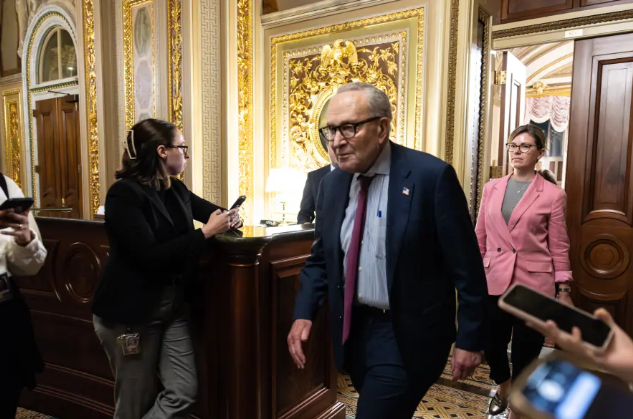Senate Advances Deal to End Historic Shutdown After Democrats Fold, Sparking Civil War Within Party
The Senate moved Sunday night toward ending the longest government shutdown in American history, advancing a bipartisan agreement that has ignited fierce backlash from Democrats and exposed deep divisions within the party.
In a 60-38 vote, the upper chamber agreed to move forward with a stopgap package funding key parts of the government through January 30, 2026. Final passage could come as early as Monday, with the House expected to approve the deal and send it to President Trump by week’s end.
The vote came after seven Senate Democrats — including Minority Whip Dick Durbin (IL), Tim Kaine (VA), Jeanne Shaheen and Maggie Hassan (NH), Catherine Cortez Masto and Jacky Rosen (NV), and John Fetterman (PA) — broke ranks and joined 52 Republicans and Independent Sen. Angus King (ME) in voting to end debate.
The deal includes three spending bills to fully fund SNAP benefits, veterans’ programs, and congressional operations through September 30, 2026. However, it does not include the extension of Obamacare subsidies that Democrats have fought to preserve — instead, it only guarantees a future vote on the issue with no commitment to passage.
Sen. Rand Paul (R-KY) was the lone Republican to vote no, citing concerns about government spending.
Democrats Explode in Rebellion
While the vote marked a breakthrough in negotiations, it also triggered an immediate civil war within the Democratic Party.
Senate Minority Leader Chuck Schumer (D-NY), who voted against the deal, blasted the compromise on X during the vote, declaring: “Democrats have been fighting for months to address America’s healthcare crisis… We will keep fighting.”
Sen. Bernie Sanders (I-VT) echoed the outrage with a blunt assessment: “Tonight was a very bad night.”
In the House, Democrats erupted. Minority Leader Hakeem Jeffries (D-NY) accused Republicans of trying to end the shutdown without protecting health insurance subsidies for millions of Americans.
“It now appears that Senate Republicans will send the House of Representatives a spending bill that fails to extend the Affordable Care Act tax credits,” Jeffries said. “We will fight the GOP bill in the House.”
Progressives were even more scathing.
Rep. Ritchie Torres (D-NY) called the compromise “an unconditional surrender that abandons the 24 million Americans whose health care premiums are about to double.” Rep. Greg Casar (D-TX), head of the Congressional Progressive Caucus, dismissed the deal as “capitulation,” and Rep. Angie Craig (D-MN) slammed it as “a bridge to nowhere.”
GOP Declares Victory
The deal is a significant win for President Trump and Senate Republicans, who stood firm during the seven-week standoff and ultimately secured a compromise without conceding to Democrat demands for guaranteed healthcare subsidies.
Senate Majority Leader John Thune (R-SD) — who had offered a vote on the Obamacare credits three weeks ago only to be rebuffed — framed the final agreement as a sign of Democratic retreat. The deal also includes back pay and reemployment for federal workers laid off during the shutdown, which had shuttered large portions of the government and caused widespread disruption to air travel, food assistance programs, and other services.
Thune made no promises about the eventual outcome of the Obamacare subsidy vote, and House Speaker Mike Johnson (R-LA) has not committed to bringing it up at all.
Democrats had blocked 14 GOP funding bills in the Senate over the past month, refusing to reopen the government without a guarantee on the health insurance subsidies. That strategy ultimately collapsed under the weight of rising public pressure, massive flight delays, and deepening economic uncertainty.
What’s Next
Assuming the deal clears Congress and is signed by Trump, the federal government will be funded through January 30, giving lawmakers just over two months to negotiate the remaining nine appropriations bills that cover the rest of the federal government for fiscal year 2026.
Until then, Democrats will be forced to reckon with the political fallout from a shutdown fight they appear to have lost — and a growing fracture between moderates and progressives that could shape the 2026 midterms.

